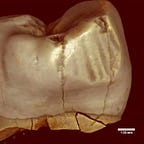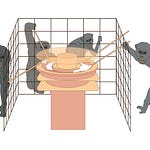Fossilized Habits, Misread
If you look closely at the fossilized teeth of Homo erectus, Neanderthals, or even early Homo sapiens, you might spot a fine, shallow groove running across the surface near the gumline. Archaeologists have been fascinated by these marks for decades. To many, they seemed like intimate evidence of an ancient gesture: early humans picking between their teeth with a sliver of bone or a slanted stick, seeking relief from gum pain or wedged food.

These so-called toothpick grooves became one of paleoanthropology’s most humanizing details—a habit preserved in enamel. But new evidence suggests this story might not hold up.
A team of researchers led by Dr. Ian Towle of Kyoto University examined the teeth of more than 500 wild primates, across 27 living and extinct species, and discovered something surprising. The same kinds of grooves appear in nonhuman primates—none of whom are known to use tools to clean their teeth.
Their findings, published in The American Journal of Biological Anthropology1, complicate one of the simplest and most enduring narratives about our ancestors: that every mark on a fossil tooth carries a cultural explanation.
“We’ve built elaborate behavioral stories around grooves that may have nothing to do with culture at all,” says Dr. Lena Hoffmann, a dental anthropologist at the University of Zurich. “Sometimes, biology—not symbolism—writes the record.”










